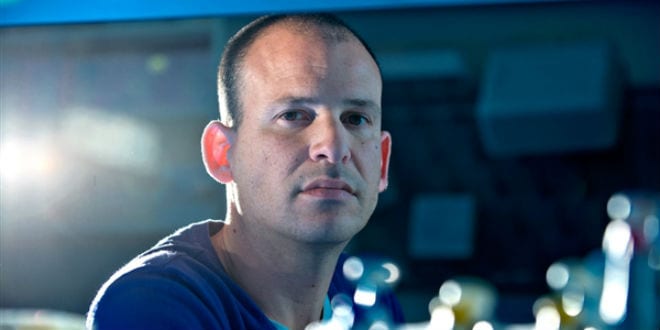Cancer is not one disease but many, each according to the organ it affects. In fact, there is no organ in the body that is not attacked by a cancer, except the heart, in which primary malignant tumors are extremely rare.
When cures will be discovered for all these cancers, it will not be the achievement of one or even 100 oncology researchers, but rather tens of thousands of scientists working for decades in basic research around the world plus hundreds of thousands of clinical oncologists facing their patients. A single Nobel Prize for Medicine or Physiology cannot be awarded to the huge number of people involved in such achievement, as each researcher and physician contributes, like many people adding a single brick to build a wall.
One of the Israelis making an important contribution to that wall is Dr. Niv Papo of Ben-Gurion University’s department of biotechnology engineering and the National Institute of Biotechnology in Beersheba. He and his basic research colleagues have just published what they called a “groundbreaking” paper in the prestigious journal Nature Communications.
Targeting certain proteins, families of proteins and especially protein-protein interactions could inhibit their ability to develop into a range of diseases, including certain cancers, Papo said. The discovery promises cutting-edge preventative and therapeutic treatment methods, the BGU team said.
Current research on a wide variety of diseases, including some cancers, has implicated certain proteins in the development and progression of these diseases. Scientists therefore believe that observing the relevant interactions could open the way to developing new therapeutics and ultimately to understanding some of the mechanisms responsible for the development of such diseases.
“This is a major step in this direction,” Papo said. “By focusing on a protein family known as serine proteases, we showed that it is possible to specifically target and inhibit two proteins (called KLK6 and mesotrypsin) that are involved in cancer progression and other proteins (anionic and cationic trypsins) that are associated with the development of pancreatitis [inflammation of the pancreas].”
Papo explained that the research rests on scientists’ ability to map the “binding specificity landscape” of interacting proteins. To function in a biological setting, proteins in the RNA (ribonucleic acid molecule essential in various biological roles in coding, decoding, regulation and expression of genes) must choose among alternative binding sites in the RNA. This is crucial both for fundamental science and for the development of drugs. However, the limitations of currently available methods for mapping this “landscape” make it difficult to develop specific inhibitors for clinically important proteins.
Overcoming those limitations has thus become the goal of Papo and his team, master of science student Si Naftali and doctoral student Itai Cohen, in cooperation with crystallographers Anat Shahar, also of Ben-Gurion University and Prof. Evette Radisky of the Mayo Clinic, located in Jacksonville, Florida.
The research team combined two groundbreaking techniques to provide an unprecedentedly rich analysis of the binding specificity landscape of proteins in a rapid, cost-effective process.
Papo went on to say that his new approach would increase the understanding of the mechanisms and evolutionary origins of specific interactions between proteins and make it easier to design specific inhibitors that can choose among protein targets with a similar structure.
Indeed, as many disease-related proteins belong to large families of related proteins, increasing target selectivity is a highly desirable but challenging goal in drug development. “The new approach thus offers great promise for designing novel target-specific therapeutics,” Papo said.
The 46-year-old Papo earned his bachelor’s and master’s of science degrees at the Hebrew University of Jerusalem and then completed his doctorate in biological chemistry 12 years ago at the Weizmann Institute of Science in Rehovot. Among his research interests are protein engineering, cancer therapy and wound healing.
Earlier this year, Papo made waves among experts in osteoporosis (a crippling disease in which bones become brittle and fragile by discovering that a natural protein in the body can be tailored to function as a drug to treat this condition, which is especially widespread among older women.
Osteoporosis is caused by a disturbance of the normal balance between the production of new bone tissue and the breakdown of old tissue by bone-removing cells, known as osteoclasts. Current drugs for osteoporosis work by completely shutting off this breakdown, known as bone absorption, for an uncontrolled amount of time. This increases the risk for adverse side effects, such as low blood calcium, atypical fractures and destruction of the jaw bone.
“These problems – combined with digestive side effects – limit the use of currently available drugs and often makes patients unwilling to continue taking the medications. So even though progress has been made in treating patients with fragile and thin bones, there remains a significant demand for safer and more specific osteoporosis drugs with a prolonged biological effect.
The researchers said the drug is based on a natural human protein that has been modified to inhibit the bone destruction activity of osteoclasts by simultaneously targeting two receptors present on these cells. They showed that in an animal model for osteoporosis, the drug can effectively prevent bone absorption.
“We are also confident that such modified protein compounds could also work on other diseases, including other bone diseases and certain types of cancer, particularly metastatic bone cancer,” concluded Papo.




